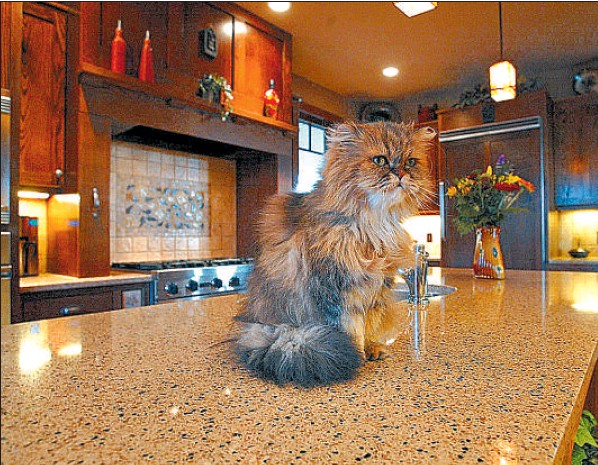MIKE HOLMES
Province

Quartz countertops are pricier than granite, but they can be tougher when it comes to stains and scratching and keeping out germs. — CANWEST NEWS SERVICR
The big debate in kitchen renovations these days seems to be granite countertops vs. quartz. I’ve used both and like both.
I like natural products — like hardwood and granite. But there are some huge advantages to using man-made products — like engineered hardwood floors or engineered stone countertops. They are sometimes more durable, easier to maintain or to work with, and are just as beautiful.
Quartz countertops are manmade. They are engineered from a mixture of minerals — mostly but not 100 per cent quartz. The mineral crystals are ground and mixed with resins, bonding agents and colour. Then they’re compressed and heated until solid and impervious to moisture and bacteria.
Basically, what the manufacturers are doing is mimicking nature. Natural granite is a mixture of stone and minerals bound together by the intense pressure and heat deep in the earth.
Quartz is one of the hardest minerals on earth. Natural granite has a percentage of quartz in it, but it’s never as high as the percentage in engineered quartz countertops — which can be as high as 93 per cent. That’s what makes quartz countertops so durable and scratch resistant.
The appearance of your countertop depends on the size of the quartz crystals used — fine crystals will look more uniform than larger ones. And the colour of your counter, since it’s manufactured, will be consistent through the whole countertop. The colour you see on the sample chip is the same as you’ll get in your kitchen.
Every piece of granite, since it’s natural, is unique. Which means the little sample pieces you get to choose from might not represent what your whole counter might look like.
When it comes to choosing between granite and quartz, you need to think about your kitchen design, and your taste. If your countertop is a complex shape and will need lots of pieces and cuts, odds are those seams will be more noticeable in granite than in quartz. Since a granite countertop is a cut slab of rock, it’s not going to be uniform. Quartz will be consistent throughout in pattern and colour, so seams are easier to hide and match.
What I look for in a kitchen counter is that it’s easy to keep clean. You want to make sure it’s non-porous, so bacteria can’t get into it. Some counters I’ve seen are so porous it’s scary: preparing food on them is as unhealthy as wiping your counter with raw chicken.
Quartz countertops are nonporous and impervious to bacteria. That doesn’t mean germs won’t live on the surface — it means they won’t penetrate it.
Granite also needs very little maintenance. Many quartz countertop manufacturers make a big deal about how “porous” and “soft” granite is, in comparison to quartz. It’s a marketing strategy for manufacturers of a competitive product, making it sound like it’s a huge hassle to reseal your granite so consumers might choose something else.
Yes, granite does need to be sealed every year, but it’s not a big deal — it’ll only take an hour or so. It’s not“high-maintenance.”
But for some people any maintenance is too much maintenance. Yes, it’s true, unsealed granite is more porous than quartz, so don’t forget to seal your granite!
Engineered stone countertops are a great product: durable, beautiful and long-lasting. They are heavier than granite and they take highly trained and certified professionals to install them — definitely not a DIY project. And they are expensive — they’re at the upper end of your countertop options. But you get what you pay for.
For more information on home renovations go to makeitright.ca.
